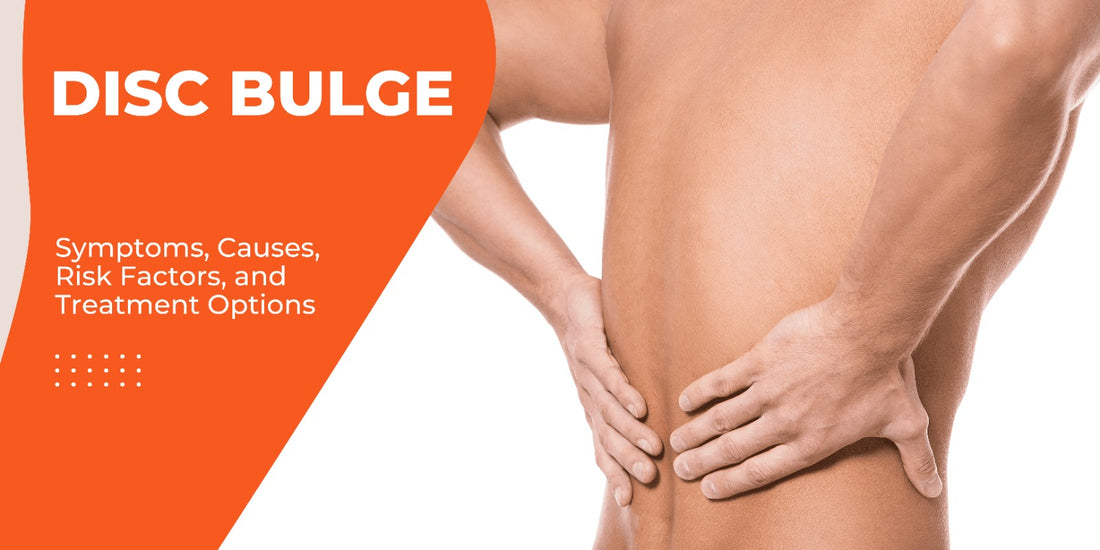
Disc Bulge: Symptoms, Causes, Risk Factors, and Treatment Options
Share

What is Disc Bulge/Bulging Disc?
The intervertebral discs in our spine play an important role in providing cushion and support between the vertebrae. However, over time or due to injury, these discs can become damaged, leading to a condition known as Disc Bulge or bulging disc.
 In a disc bulge, the disc bulges out beyond its normal boundaries and can cause a range of symptoms, including lower back pain, sciatica, stiffness, and numbness or tingling in the limbs. If the bulging disc puts pressure on the spinal nerves, it can lead to additional pain and discomfort.
In a disc bulge, the disc bulges out beyond its normal boundaries and can cause a range of symptoms, including lower back pain, sciatica, stiffness, and numbness or tingling in the limbs. If the bulging disc puts pressure on the spinal nerves, it can lead to additional pain and discomfort.

Here, we'll take a closer look at the symptoms, causes, risk factors, and treatment options for disc bulge.
Symptoms of Disc Bulge
The following are some of the most common symptoms of disc bulge:
- Lower back pain
- Sciatica (pain that radiates down the legs)
- Stiffness
- Numbness or tingling in the limbs
- Weakness in the legs
- Difficulty standing or walking
It's important to note that not everyone who has a disc bulge will experience symptoms. Some people may only have mild discomfort, while others may experience severe pain and disability.
Causes of Disc Bulge
Disc bulge can be caused by a number of factors including:
- Aging: As we get older, our discs can become weaker and more prone to damage.
- Degenerative changes in the disc: Over time, the discs in our spine can lose their elasticity and become more prone to bulging.
- Injury: A sudden injury, such as a car accident or a fall, can cause a disc to bulge.
Risk Factors for Disc Bulge
The following are some of the factors that may increase your risk of developing a disc bulge:
- Age: The risk of disc bulge increases as we get older.
- Genetics: Some people may have a genetic predisposition to developing disc problems.
- Lifestyle factors: Smoking, being overweight or obese, and having a sedentary lifestyle can all increase the risk of disc bulge.
- Occupational hazards: Certain jobs that involve heavy lifting, twisting, or repetitive motions can increase the risk of disc bulge.
Treatment Options for Disc Bulge
The treatment options for disc bulge will depend on the severity of the condition and the individual's symptoms. In many cases, conservative measures such as physical therapy, pain medication, supplements and rest can be effective.
- Spinal injections: A corticosteroid injection can help reduce inflammation and relieve pain.
- Physical therapy: Exercises and stretches can help strengthen the muscles in the back and improve flexibility.
- Surgery: In severe cases, surgery may be recommended to remove the bulging portion of the disc.
- Supplements : The ingredients in such supplements typically aim to promote joint, cartilage, and disc health by reducing inflammation, supporting collagen production, and providing nutrients essential for spinal support. Below is an overview of how common ingredients might help with disc problems:
- Role: Promotes the production of cartilage and connective tissue, helping to maintain the integrity of spinal discs.
- Benefits: May reduce inflammation and support the regeneration of worn or damaged discs.
-
- Role: Helps cartilage retain water, maintaining elasticity and shock absorption in the discs.
- Benefits: Works synergistically with glucosamine to slow cartilage breakdown and potentially relieve pain.
-
- Role: Provides sulfur, essential for collagen production and connective tissue health.
- Benefits: May reduce inflammation and enhance joint flexibility and spinal support.
- Role: Contains anti-inflammatory and antioxidant properties.
- Benefits: Reduces inflammation in the spine, potentially alleviating pain associated with degenerative disc disease.
- Role: Anti-inflammatory herb that supports joint and spinal health.
- Benefits: May reduce stiffness and improve mobility.
Hyaluronic Acid
- Role: Helps lubricate and cushion joints and discs.
- Benefits: Improves hydration and reduces wear and tear on spinal discs.
Collagen Peptides
- Role: Provide the building blocks for connective tissues, including spinal discs.
- Benefits: May improve disc strength and elasticity over time.
Vitamin C and Zinc
- Role: Essential for collagen synthesis and tissue repair.
- Benefits: Support the healing and regeneration of damaged discs.
and many more...
Conclusion
Disc bulge is a common condition that can cause a range of symptoms, including lower back pain, sciatica, and numbness or tingling in the limbs. If you're experiencing symptoms of disc bulge, it's important to seek medical attention to determine the best course of treatment. With the right combination of conservative and medical interventions, most people are able to find relief from their symptoms and return to their normal activities.
References
-
American Academy of Orthopaedic Surgeons. (2020). Degenerative Disc Disease. https://orthoinfo.aaos.org/en/diseases--conditions/degenerative-disc-disease/
-
National Institute of Neurological Disorders and Stroke. (2021). Herniated Disc. https://www.ninds.nih.gov/Disorders/Patient-Caregiver-Education/Fact-Sheets/Herniated-Disc-Fact-Sheet
-
Mayo Clinic. (2021). Herniated Disk. https://www.mayoclinic.org/diseases-conditions/herniated-disk/symptoms-causes/syc-20354095
-
Spine-health. (2021). Herniated Disc. https://www.spine-health.com/conditions/herniated-disc
-
WebMD. (2021). Herniated Disk. https://www.webmd.com/back-pain/guide/herniated-disk-symptoms-causes-treatments

